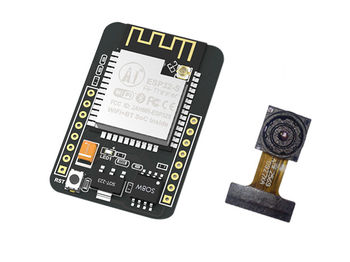Esp32cam: Difference between revisions
No edit summary |
|||
| Line 30: | Line 30: | ||
* https://github.com/donny681/ESP32_CAMERA_QR | * https://github.com/donny681/ESP32_CAMERA_QR | ||
* [https://youtu.be/q7Z_XnBYFhY Step by step video guide to getting it up and running with Arduino IDE and the Expressif CameraWebServer example] | * [https://youtu.be/q7Z_XnBYFhY Step by step video guide to getting it up and running with Arduino IDE and the Expressif CameraWebServer example] | ||
* https://github.com/geeksville/TenDollarWebcam | |||
=== platformio === | === platformio === | ||
Revision as of 19:47, 5 February 2019
| Project ESP32-CAM | |
|---|---|

| |
| Cheap webcams with Wifi, what could possibly go wrong? | |
| Status | In progress |
| Contact | noopwafel, Sebastius, bertrik |
| Last Update | 2019-02-05 |
Introduction
It's an ESP32 board with a camera, running a web server, so it acts as an inexpensive webcam.
Hardware
To install the camera, *flip* the black part of the camera connector UP, insert the camera connector (contacts towards the PCB), then flip the black part back into the flat position.
Pins (ESP32 cam to USB serial converter):
- ESP-32 5V to USB serial 5V
- ESP-32 GND to USB serial GND
- ESP-32 UAR to USB-serial TX
- ESP-32 UAT to USB-serial RX
- ESP-32 IO0 looped to ESP-32 GND (they are next to each other), you can use a jumper or a dupont wire. CLOSED for flashing, OPEN for running.
Software
- maybe https://github.com/m5stack/m5stack-cam-psram ?
- https://github.com/donny681/ESP32_CAMERA_QR
- Step by step video guide to getting it up and running with Arduino IDE and the Expressif CameraWebServer example
- https://github.com/geeksville/TenDollarWebcam
platformio
The CameraWebServer example can be compiled as a platformio project: https://github.com/bertrik/CameraWebServer
To build the code, clone the git repo above, cd into it, then type
pio run
To upload it to the board (put a jumper between IO0 and GND):
pio run -t upload
To watch the debug output (remove the jumper):
pio device monitor
Platformio can be installed on a Debian Linux system as follows:
sudo apt-get install python-pip sudo pip install platformio pio upgrade